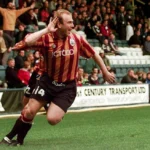
If there’s one reason why football is the biggest sport in the universe, it’s because of its accessibility. In contrast to other high-income sports like golf, tennis and lacrosse, football can be played by anyone, anywhere.
It’s no coincidence that so many of the game’s greatest footballers, be that Diego Maradona, Pele, Lionel Messi and Eusebio have come from gritty, impoverished backgrounds. These players knew that football was their only way out, and it’s why they gave it everything they had in pursuit of greatness.
Another player who used football to catapult himself out of poverty is Gordon Watson.
Born in Sidcup, England, Watson bounced around from children’s homes in South London and was placed on a care order by a judge, often being forced to scrape around the back of his sofa for money that had fallen out of his parents’ pockets in order to buy something to eat. However, he would find an escape route in football, plying his trade for Charlton Athletic’s academy before eventually ascending to the first team, where he scored seven goals in 31 appearances in the Football League. He made the step up to the top-flight in 1991 when he joined Sheffield Wednesday for £250,000 with a further £100,000 payable depending on appearances – that same year, he made his only two international appearances for England’s U-21s in a match against Senegal before scoring against the Commonwealth of Independent States.
Nicknamed ‘Flash’ after the comic book hero Flash Gordon, Watson proved to be flash by name, flash by nature. “My nan died in 1981, and she was the last person to call me Gordon,” reflected Watson in an exclusive My Joy Online interview. “It was just because I was born in the 70s, blonde hair, blue eyes, and obviously that was the cartoon character or the television program of when I was, like, 7 or 8, and I was quite quick as a youngster as well.”
Watson excelled with the Owls and eventually attracted the interest of fellow Premier League outfit Southampton in 1995, where he became an impressive figure from the attacking midfielder position. According to Holley & Chalk’s In That Number, Watson was “an effervescent, never-say-die forward, the sort the crowd always love and, although not the most skilful of front-runners, he had a swashbuckling style that unnerved defences.” He would end his Southampton chapter in January 1997 after a humiliating FA Cup defeat at Reading; two weeks later, Watson was sold to Bradford City for a club-record £500,000[4] and was the club’s then record signing.
He kicked off his time in Bradford by grabbing an assist in his second appearance, a 1-0 win vs. Port Vale, but his third appearance would draw to a close after just four minutes following a horrific tackle from Huddersfield Town defender Kevin Gray.
Watson suffered a double fracture to his right leg and spent 18 months away from the pitch, prompting him to take Gray and Huddersfield to court and earn a British record fee of £959,143. He returned in September 1998 and grabbed a quickfire brace in just his second appearance back from injury, helping the Bantams earn promotion to the top-flight for the first time in 77 years.
He declined a new contract from Bradford, stating that he was neither fit enough nor good enough to represent them in the top division, before deciding to play for Bournemouth for free in order to get his career back in track. However, Watson failed to bounce back with the Cherries and failed to score in his 11 appearances before making the move to Portsmouth’s reserve side. He then joined Hartlepool United, where he scored 23 goals in 49 games in the Football League and helped them return to England’s third tier after a decade, before riding off into the sunset and hanging up his boots at the age of 32. 22 years after hanging up his boots, Watson is now raising his son in Costa Rica with his wife, but he has remained more closely connected than ever to the English game by hosting podcasts and match previews on BetUS Soccer Channel.
“Has the game changed? It depends on who you listen to. I think there are a few frauds in the game, because you’ve got people sitting there on their laptops, saying ‘in transition.’ That’s basically on the break, closing down is now front press. They’re all the same, but they’ve come out with new words. Would you say that Barcelona under Pep Guardiola, was tiki-taka? Because I saw them play two-touch and wreck teams apart with precise movement and passing. No, the game has not changed.”



